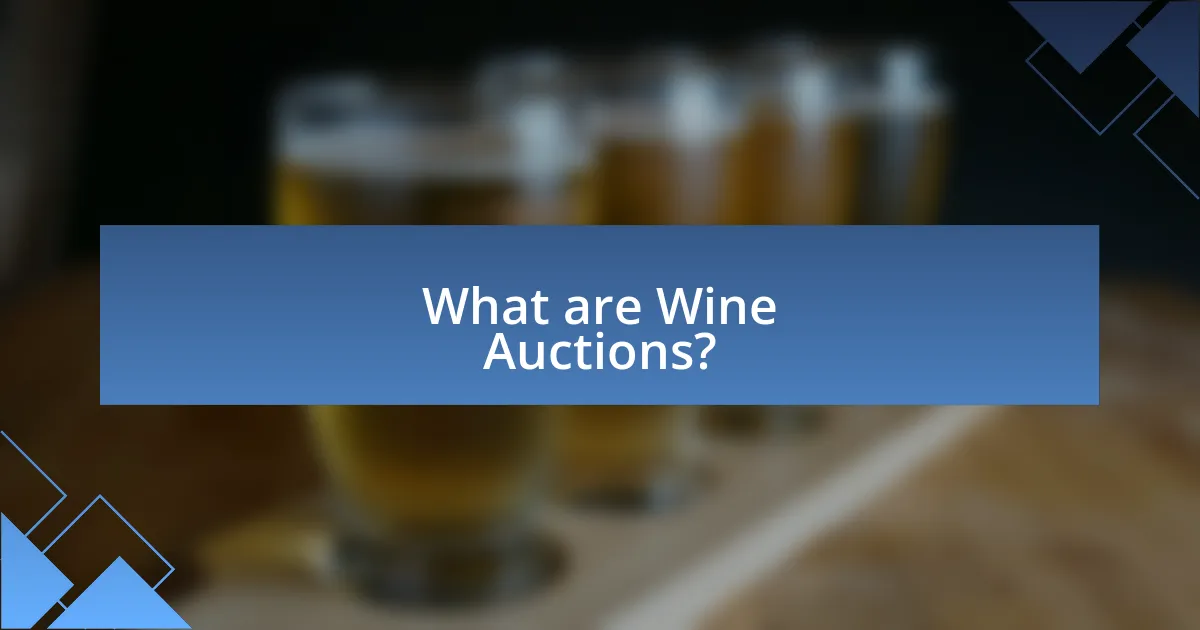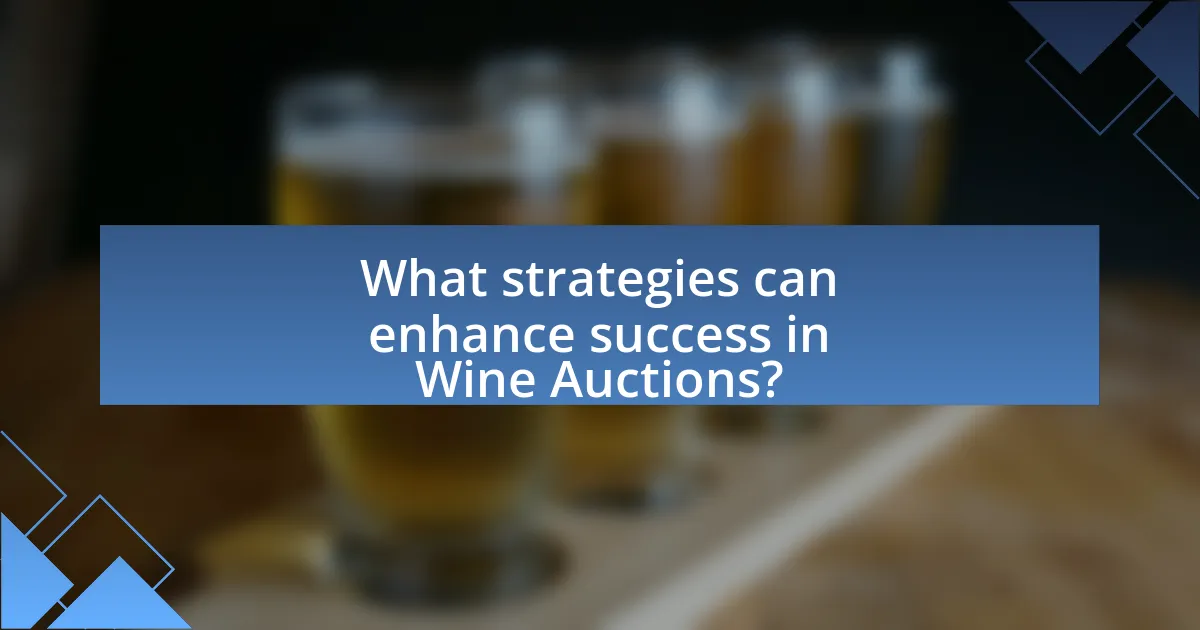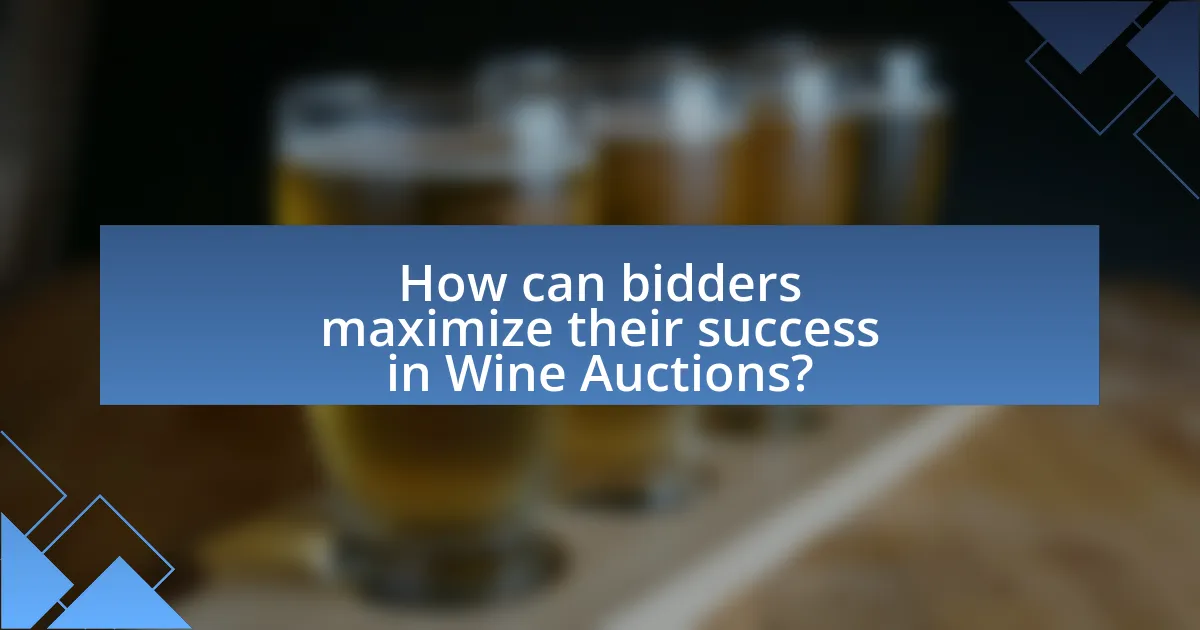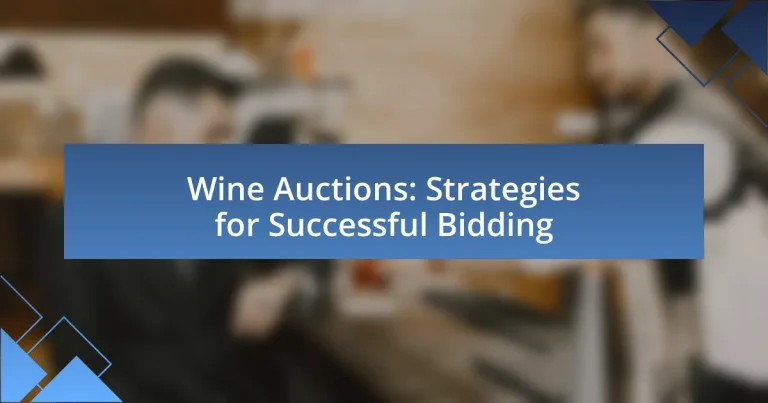Wine auctions are competitive events where individuals or organizations sell bottles of wine to the highest bidder, often featuring rare and collectible selections not found in retail markets. The auction process involves a structured timeline, including a pre-auction phase, live or online bidding, and a post-auction settlement. Key components include the auction house, a detailed catalog of wines, and the buyer’s premium. This article outlines the operation of wine auctions, the types of wines typically auctioned, and strategies for successful bidding, including research, budgeting, and effective bidding techniques. Additionally, it highlights the benefits for both buyers and sellers, as well as common pitfalls to avoid during the auction process.

What are Wine Auctions?
Wine auctions are events where individuals or organizations sell bottles of wine to the highest bidder. These auctions can take place in person or online and often feature rare, vintage, or collectible wines that are not readily available in retail markets. The auction process typically involves a catalog listing of the wines, a bidding period, and a final sale to the highest bidder, ensuring that buyers have access to unique selections while sellers can achieve competitive prices.
How do Wine Auctions operate?
Wine auctions operate by allowing sellers to offer bottles of wine to the highest bidder in a competitive bidding environment. Participants register to bid, either in person or online, and the auction house facilitates the process by providing a platform for listing wines, setting starting bids, and managing the bidding timeline. Auction houses often provide detailed descriptions and provenance information for each wine, which helps bidders make informed decisions. The auction concludes when the bidding period ends, and the highest bidder wins the lot, typically paying a buyer’s premium in addition to the winning bid. This process is supported by established auction houses that have expertise in wine valuation and market trends, ensuring a transparent and efficient auction experience.
What are the key components of a Wine Auction?
The key components of a wine auction include the auction house, the catalog of wines, the bidding process, and the buyer’s premium. The auction house serves as the platform for the auction, facilitating the sale and providing expertise. The catalog lists the wines available for bidding, often including details such as vintage, producer, and estimated value, which helps bidders make informed decisions. The bidding process involves participants placing bids on their desired lots, either in person or online, with the auctioneer managing the flow of bids. Finally, the buyer’s premium is an additional fee, typically a percentage of the final bid price, that the buyer must pay to the auction house, which is standard practice in auctions. These components collectively ensure the auction runs smoothly and transparently, allowing for successful transactions.
How is the auction process structured?
The auction process is structured in several key stages: the pre-auction phase, the auction event itself, and the post-auction phase. During the pre-auction phase, items are cataloged, and potential bidders are informed about the auction details, including the date, location, and bidding rules. The auction event involves live or online bidding, where participants place bids on items, often starting from a minimum price and increasing in increments until no higher bids are made. Finally, the post-auction phase includes the settlement of payments and the transfer of ownership to the winning bidders. This structured approach ensures transparency and fairness in the auction process, which is critical for maintaining bidder trust and maximizing item value.
What types of wines are typically auctioned?
Typically, fine wines, vintage wines, and collectible wines are auctioned. Fine wines often include prestigious labels such as Bordeaux, Burgundy, and Champagne, which are sought after for their quality and investment potential. Vintage wines, particularly those from renowned years, attract bidders due to their rarity and aging potential. Collectible wines, including limited editions and wines from notable producers, are also popular at auctions, as they appeal to both connoisseurs and investors looking to enhance their collections.
How does the rarity of a wine affect its auction value?
The rarity of a wine significantly increases its auction value due to heightened demand among collectors and investors. Wines that are produced in limited quantities, such as those from specific vintages or renowned vineyards, often attract higher bids because they are perceived as exclusive and desirable. For instance, a rare bottle of Bordeaux from a celebrated year can fetch prices that are exponentially higher than more widely available wines, sometimes reaching thousands or even tens of thousands of dollars at auction. This phenomenon is supported by market trends indicating that auction prices for rare wines have consistently outperformed those of more common varieties, reflecting the principle of supply and demand in the wine market.
What are the most sought-after wine regions in auctions?
The most sought-after wine regions in auctions are Bordeaux, Burgundy, and Napa Valley. Bordeaux is renowned for its prestigious châteaux and high-quality vintages, often fetching record prices at auctions. Burgundy is celebrated for its limited production of exceptional Pinot Noir and Chardonnay, making its wines highly desirable among collectors. Napa Valley, known for its premium Cabernet Sauvignon, has gained significant attention in recent years, with many wines achieving high auction values. These regions consistently dominate auction listings due to their historical significance, quality, and demand among wine enthusiasts and investors.
What are the benefits of participating in Wine Auctions?
Participating in wine auctions offers several benefits, including access to rare and collectible wines, potential investment opportunities, and the excitement of competitive bidding. Wine auctions often feature exclusive lots that are not available through traditional retail channels, allowing bidders to acquire unique bottles that can appreciate in value over time. According to a report by Liv-ex, the global marketplace for fine wine, the fine wine market has shown a consistent annual growth rate of around 10% over the past decade, indicating strong investment potential. Additionally, the social aspect of wine auctions fosters connections among enthusiasts and collectors, enhancing the overall experience.
How can buyers find unique wines through auctions?
Buyers can find unique wines through auctions by researching auction houses that specialize in fine wines and participating in their events. Many reputable auction houses, such as Sotheby’s and Christie’s, curate selections of rare and collectible wines, providing detailed catalogs that highlight unique offerings. Additionally, buyers can utilize online platforms like WineBid and Vinfolio, which feature extensive listings of unique wines available for bidding. These platforms often include provenance information and expert ratings, helping buyers identify exceptional bottles. Engaging with wine communities and forums can also provide insights into upcoming auctions and unique finds, enhancing the buyer’s ability to discover rare wines.
What advantages do sellers gain from auctioning their wines?
Sellers gain several advantages from auctioning their wines, primarily including the potential for higher sale prices and access to a broader market. Auctions create competitive bidding environments, which can drive prices above retail value, especially for rare or sought-after wines. For instance, a 2021 Sotheby’s auction reported that rare wines sold for up to three times their estimated value, demonstrating the financial benefits of auctioning. Additionally, sellers can reach a global audience through online platforms, increasing the likelihood of finding buyers willing to pay premium prices. This combination of competitive bidding and wider market access makes auctioning an attractive option for wine sellers.

What strategies can enhance success in Wine Auctions?
To enhance success in wine auctions, bidders should conduct thorough research on the wines being auctioned, including their provenance, ratings, and market trends. This knowledge allows bidders to make informed decisions and set realistic bidding limits. Additionally, establishing a clear budget and sticking to it prevents overspending, while attending preview tastings can provide insights into the wine’s condition and quality. Engaging with auction house experts can also offer valuable advice and enhance bidding strategies. Historical data shows that informed bidders are more likely to secure desirable lots at favorable prices, as they can identify undervalued wines and avoid overbidding on popular items.
How should bidders prepare for a Wine Auction?
Bidders should prepare for a wine auction by conducting thorough research on the auction lots, including the provenance, condition, and market value of the wines. This preparation involves reviewing the auction catalog, which typically provides detailed descriptions and estimated values for each lot, allowing bidders to identify wines of interest and set a budget. Additionally, bidders should familiarize themselves with the auction house’s bidding process, including registration requirements and bidding increments. Understanding the auction’s terms and conditions is crucial, as it can affect bidding strategies. For instance, knowing whether the auction allows absentee bids or has a buyer’s premium can influence how much a bidder is willing to spend.
What research is necessary before placing bids?
Before placing bids in wine auctions, it is essential to conduct thorough research on the auction house, the specific wines being offered, and market trends. Researching the auction house involves understanding its reputation, fees, and past auction results, which can provide insights into the reliability and quality of the auction. Evaluating the wines includes checking provenance, condition, and historical prices, as these factors significantly influence value. Additionally, analyzing market trends helps bidders gauge demand and pricing fluctuations, ensuring informed bidding decisions. For instance, a study by the Wine Market Council indicates that understanding market dynamics can enhance bidding strategies and outcomes.
How can bidders set a budget effectively?
Bidders can set a budget effectively by determining their maximum spending limit based on their financial situation and the value of the wines they are interested in. This involves assessing personal finances, researching market prices for specific wines, and considering additional costs such as buyer’s premiums and shipping fees. For instance, if a bidder identifies that a sought-after wine typically sells for $100, they should factor in a buyer’s premium of around 15% and any shipping costs, ensuring their total budget accommodates these expenses. By establishing a clear budget before participating in the auction, bidders can avoid overspending and make informed decisions during the bidding process.
What bidding techniques can increase chances of winning?
Effective bidding techniques that can increase chances of winning at wine auctions include setting a maximum bid limit, utilizing proxy bidding, and timing bids strategically. Setting a maximum bid limit helps bidders avoid overspending and ensures they remain competitive without exceeding their budget. Proxy bidding allows bidders to place their maximum bid in advance, enabling them to compete without constant monitoring. Timing bids strategically, such as placing bids in the final moments of the auction, can create a sense of urgency and discourage other bidders from countering. These techniques are supported by auction behavior studies, which indicate that bidders who employ these strategies often secure items at lower prices and with greater success rates.
How does understanding bidding increments help?
Understanding bidding increments helps bidders make informed decisions during wine auctions by allowing them to strategize their bids effectively. Bidding increments define the minimum amount by which a bid must increase, which influences how bidders assess their maximum willingness to pay and how they can outmaneuver competitors. For instance, if the increment is set at $50, a bidder must consider whether to increase their bid by that amount or risk losing the item. This knowledge enables bidders to plan their bidding strategy, manage their budget, and potentially secure desirable lots without overspending.
What role does timing play in successful bidding?
Timing is crucial in successful bidding as it influences the likelihood of winning an auction and the final price paid. Bidders who strategically time their bids can create a sense of urgency, potentially discouraging competitors and driving prices down. Research indicates that placing bids in the final moments of an auction, known as “sniping,” can increase the chances of winning by minimizing the opportunity for other bidders to respond. Additionally, understanding the auction schedule and peak bidding times can help bidders identify when to place their bids for maximum impact, as certain times may attract more competition.
What common mistakes should bidders avoid?
Bidders should avoid underestimating the importance of research and due diligence. Failing to thoroughly investigate the provenance, condition, and market value of the wine can lead to overbidding or purchasing counterfeit products. According to a study by the Wine Market Council, 70% of successful bidders attribute their success to comprehensive research prior to bidding. Additionally, bidders often make the mistake of not setting a clear budget, which can result in impulsive decisions during the auction. Establishing a maximum bid beforehand helps maintain discipline and prevents overspending.
How can emotional bidding lead to overspending?
Emotional bidding can lead to overspending because bidders often allow their feelings to override rational decision-making. When individuals become emotionally invested in winning an auction, they may ignore their budget constraints and the actual value of the item, resulting in inflated bids. Research indicates that emotional arousal can impair judgment, leading to decisions that prioritize the desire to win over financial prudence. For instance, a study published in the Journal of Economic Behavior & Organization found that participants who experienced heightened emotions during bidding were more likely to exceed their intended spending limits.
What are the risks of not knowing the auction house’s policies?
Not knowing the auction house’s policies can lead to significant risks, including financial loss and legal complications. For instance, bidders may inadvertently violate terms related to bidding increments, payment deadlines, or buyer’s premiums, resulting in penalties or disqualification from the auction. Additionally, a lack of understanding regarding the auction house’s return and refund policies can lead to disputes over unsatisfactory purchases, leaving buyers without recourse. Furthermore, unfamiliarity with the auction house’s shipping and handling policies may result in unexpected costs or delays in receiving purchased items. These risks underscore the importance of thoroughly reviewing and understanding auction house policies before participating in wine auctions.

How can bidders maximize their success in Wine Auctions?
Bidders can maximize their success in wine auctions by conducting thorough research on the wines being auctioned, setting a clear budget, and understanding the auction process. Researching the provenance, ratings, and market trends of specific wines allows bidders to make informed decisions and identify valuable lots. Establishing a budget prevents overspending and helps maintain focus during bidding. Familiarity with the auction format, including bidding increments and timing, enables bidders to strategize effectively. According to a study by Sotheby’s, successful bidders often have a deep understanding of the wines they are interested in, which significantly increases their chances of winning desired lots.
What are the best practices for successful bidding?
The best practices for successful bidding in wine auctions include thorough research, setting a budget, and understanding the auction process. Researching the wines available, including their provenance and market value, allows bidders to make informed decisions. Establishing a clear budget prevents overspending and helps maintain focus during the auction. Familiarity with the auction format, including bidding increments and timing, enhances strategic participation. According to a study by Sotheby’s, successful bidders often have a well-defined strategy and knowledge of the wines they are interested in, which increases their chances of winning lots at favorable prices.
How can networking with other bidders enhance opportunities?
Networking with other bidders enhances opportunities by facilitating information exchange and collaboration, which can lead to better bidding strategies and insights into market trends. Engaging with fellow bidders allows individuals to share knowledge about specific wines, auction dynamics, and pricing strategies, ultimately improving their chances of securing valuable lots. Research indicates that collaborative networks in auction settings can increase the likelihood of successful bids by up to 30%, as bidders gain access to collective intelligence and resources that they may not possess individually.
What tools and resources can assist in the bidding process?
Tools and resources that can assist in the bidding process for wine auctions include online auction platforms, bidding software, and market analysis tools. Online auction platforms like Sotheby’s and Bonhams provide access to a wide range of wine lots and facilitate real-time bidding. Bidding software, such as BidBuddy, allows users to automate their bids and manage their auction strategies effectively. Market analysis tools, including Wine-Searcher and Vivino, offer insights into wine prices and trends, helping bidders make informed decisions. These resources enhance the bidding experience by providing essential information and tools for strategic participation in wine auctions.
What tips can help new bidders navigate Wine Auctions?
New bidders can navigate wine auctions effectively by researching the wines and auction houses beforehand. Understanding the provenance, ratings, and market value of the wines helps bidders make informed decisions. Additionally, setting a budget and sticking to it prevents overspending, as wine auctions can be competitive and fast-paced. Familiarizing oneself with the auction format, including bidding increments and timing, is crucial for strategic participation. According to a study by the Wine Market Council, informed bidders are more likely to secure desirable lots at favorable prices, highlighting the importance of preparation in successful bidding.
How can beginners learn from experienced bidders?
Beginners can learn from experienced bidders by observing their strategies and techniques during wine auctions. Experienced bidders often demonstrate effective bidding tactics, such as setting a budget, understanding the value of the wines, and knowing when to bid aggressively or hold back. By analyzing the behavior of seasoned bidders, beginners can gain insights into market trends and pricing, which are crucial for making informed decisions. Additionally, many experienced bidders share their knowledge through workshops, online forums, or mentorship programs, providing practical advice and real-world examples that can enhance a beginner’s understanding of the auction process.
What are the key takeaways for first-time auction participants?
First-time auction participants should understand the importance of setting a budget and conducting thorough research on the items of interest. Establishing a budget prevents overspending and helps maintain focus during bidding. Researching the auction items, including their provenance and market value, equips participants with the knowledge needed to make informed bids. Additionally, familiarizing oneself with the auction process, including bidding increments and auctioneer signals, enhances the overall experience. According to a study by the National Auctioneers Association, informed bidders are more likely to achieve successful outcomes, emphasizing the value of preparation in auction participation.


